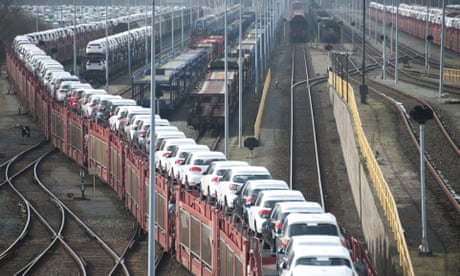The EU face five crises that could destroy it, and Brexit could be the detonator. But only modest changes could stop an implosion

Copies of German magazine Der Spiegel featuring the headline “Please don’t go!” Photograph: Bloomberg/Bloomberg via Getty Images
“Never let a crisis go to waste” has always been one of the European Union’s guiding principles. What about five simultaneous crises? Today, the EU faces what Frans Timmermans, the European commission vice-president, describes as a “multi-crisis”: Brexit, refugee flows, fiscal austerity, geopolitical threats from east and south, and “illiberal democracy” in central Europe. Rather than wasting its crises, the EU could be laid to waste by them.
If so, Brexit will be the detonator for that demolition. By legitimising the concept of an EU breakup, and so turning a fantasy among political extremists into a realistic option of mainstream politics throughout Europe, Brexit threatens to trigger an irresistible disintegration process. It will also transform economics, by paralysing the European Central Bank in the next euro crisis. The ECB can always defeat market speculation, but it is powerless against breakup pressures from voters.
The EU urgently needs to put the genie of disintegration back in its bottle. That means persuading Britain to change its mind about Europe, which, according to conventional wisdom on both sides of the English Channel, is impossible. But many “impossible” things are happening in politics nowadays.
The referendum majority on 23 June was much narrower than that in Scotland’s 2014 independence referendum, or the negative votes on EU treaties in Ireland, Denmark and the Netherlands, all of which were subsequently reversed. More important, the 52% who voted for Brexit were sharply divided in their aims, with some prepared to accept economic sacrifice for a “hard Brexit” - total separation from Europe - and others hoping for a “soft Brexit” that would minimise the impact on the UK economy.
According to post-referendum polling, three-quarters of leave voters expect Britain’s economy either to strengthen or to be unaffected by Brexit, and 80% believe the government will have more money to spend on public services as a result of their vote. Brexit voters are so optimistic because they were told - most prominently by the foreign secretary, Boris Johnson - that Britain could have its cake and eat it, a new deal that would preserve all of the economic benefits of EU membership with none of the obligations or costs.
When these expectations are disappointed, public opinion will change. Already,66% of voters say that maintaining market access is more important than restricting immigration if Britain is unable have both. This directly contradicts the prime minister Theresa May’s stated priorities, and probably explains why she refuses to talk about her Brexit strategy.
Because public expectations of an economically innocuous soft Brexit will be impossible to reconcile with the rejection of all EU obligations demanded by the Conservative party’s hard Brexit faction, May cannot win. Whichever course she chooses, she will antagonise half her party and a large proportion of Brexit supporters, not to mention the 48% of voters who want to stay in the EU.
Once this backlash starts, plenty of ambitious Conservative politicians whom May purged from government will be eager to exploit it. George Osborne, immediately sacked as chancellor when May took office, has already thrown down the gauntlet, challenging her democratic mandate: “Brexit won a majority. Hard Brexit did not.” Even the weakness of Britain’s opposition parties works against May, allowing opponents to plot against her, secure in the knowledge that they are unlikely to lose power.
All this implies that British politics will become very fluid as economic conditions deteriorate and voters start to change their minds. The EU should encourage such second thoughts, which means that it must stop treating Brexit as inevitable and instead offer the possibility of a compromise that would meet British voters’ concerns, but only on the condition that Britain remains in the EU.
The obvious way to accomplish this would be to conclude an EU-wide agreement on greater national control over immigration and other symbolic issues related to national sovereignty. Such an agreement need not be seen as a concession to British blackmail if it were extended to all EU countries and presented as a response to public opinion throughout the union.
By making a virtue of its response to democratic pressures, the EU could regain Europe-wide support. To send a positive message to voters European leaders will, however, have to rediscover the knack for pragmatic compromise and inter-governmental bargaining that used to be the hallmark of EU diplomacy.
For starters, defusing both Brexit and the refugee crisis will require some modest changes in immigration and welfare rules. Such reforms, which would be popular in almost all member countries, need not conflict with the EU’s founding principles if they preserve the right to work throughout Europe, but return some control over non-economic migration and welfare payments to national governments.
“Never let a crisis go to waste” has always been one of the European Union’s guiding principles. What about five simultaneous crises? Today, the EU faces what Frans Timmermans, the European commission vice-president, describes as a “multi-crisis”: Brexit, refugee flows, fiscal austerity, geopolitical threats from east and south, and “illiberal democracy” in central Europe. Rather than wasting its crises, the EU could be laid to waste by them.
If so, Brexit will be the detonator for that demolition. By legitimising the concept of an EU breakup, and so turning a fantasy among political extremists into a realistic option of mainstream politics throughout Europe, Brexit threatens to trigger an irresistible disintegration process. It will also transform economics, by paralysing the European Central Bank in the next euro crisis. The ECB can always defeat market speculation, but it is powerless against breakup pressures from voters.
The EU urgently needs to put the genie of disintegration back in its bottle. That means persuading Britain to change its mind about Europe, which, according to conventional wisdom on both sides of the English Channel, is impossible. But many “impossible” things are happening in politics nowadays.
The referendum majority on 23 June was much narrower than that in Scotland’s 2014 independence referendum, or the negative votes on EU treaties in Ireland, Denmark and the Netherlands, all of which were subsequently reversed. More important, the 52% who voted for Brexit were sharply divided in their aims, with some prepared to accept economic sacrifice for a “hard Brexit” - total separation from Europe - and others hoping for a “soft Brexit” that would minimise the impact on the UK economy.
According to post-referendum polling, three-quarters of leave voters expect Britain’s economy either to strengthen or to be unaffected by Brexit, and 80% believe the government will have more money to spend on public services as a result of their vote. Brexit voters are so optimistic because they were told - most prominently by the foreign secretary, Boris Johnson - that Britain could have its cake and eat it, a new deal that would preserve all of the economic benefits of EU membership with none of the obligations or costs.
When these expectations are disappointed, public opinion will change. Already,66% of voters say that maintaining market access is more important than restricting immigration if Britain is unable have both. This directly contradicts the prime minister Theresa May’s stated priorities, and probably explains why she refuses to talk about her Brexit strategy.
Because public expectations of an economically innocuous soft Brexit will be impossible to reconcile with the rejection of all EU obligations demanded by the Conservative party’s hard Brexit faction, May cannot win. Whichever course she chooses, she will antagonise half her party and a large proportion of Brexit supporters, not to mention the 48% of voters who want to stay in the EU.
Once this backlash starts, plenty of ambitious Conservative politicians whom May purged from government will be eager to exploit it. George Osborne, immediately sacked as chancellor when May took office, has already thrown down the gauntlet, challenging her democratic mandate: “Brexit won a majority. Hard Brexit did not.” Even the weakness of Britain’s opposition parties works against May, allowing opponents to plot against her, secure in the knowledge that they are unlikely to lose power.
All this implies that British politics will become very fluid as economic conditions deteriorate and voters start to change their minds. The EU should encourage such second thoughts, which means that it must stop treating Brexit as inevitable and instead offer the possibility of a compromise that would meet British voters’ concerns, but only on the condition that Britain remains in the EU.
The obvious way to accomplish this would be to conclude an EU-wide agreement on greater national control over immigration and other symbolic issues related to national sovereignty. Such an agreement need not be seen as a concession to British blackmail if it were extended to all EU countries and presented as a response to public opinion throughout the union.
By making a virtue of its response to democratic pressures, the EU could regain Europe-wide support. To send a positive message to voters European leaders will, however, have to rediscover the knack for pragmatic compromise and inter-governmental bargaining that used to be the hallmark of EU diplomacy.
For starters, defusing both Brexit and the refugee crisis will require some modest changes in immigration and welfare rules. Such reforms, which would be popular in almost all member countries, need not conflict with the EU’s founding principles if they preserve the right to work throughout Europe, but return some control over non-economic migration and welfare payments to national governments.

German business leader issues warning over post-Brexit trade with UK
Second, the interaction of the refugee and euro crises demands new fiscal rules. Dealing with immigrants is expensive and should ideally be funded by mutually guaranteed EU bonds. Alternatively, Mediterranean countries must be offered budgetary leeway, in exchange for assuming frontline responsibility for immigration controls.
Third, the need for immigration reform, combined with “illiberal democracy” in central Europe, calls for changes in EU spending priorities and foreign policy. Poland and other countries will accept restrictions on their citizens’ mobility only if offered additional structural funds and stronger security cooperation. Such incentives, in turn, could provide more levers to ensure respect for human rights.
Finally, restoring the EU’s democratic legitimacy means ending the institutional tensions between the eurozone and the broader union. The EU authorities must acknowledge that many member countries will never join the euro, which means abandoning their rhetoric about a “two-speed Europe,” with all heading – whether at high or low speed – toward the “ever closer union” that a single currency implies. Instead, the EU must reshape itself into two concentric circles: an inner core committed to deeper integration, and an outer ring whose voters have no interest in a single currency and a shared fiscal space.
Such reforms may seem impossible, but EU disintegration seemed impossible before the Brexit vote. In revolutionary periods, the impossible can become inevitable in a matter of months. This week, former French president Nicolas Sarkozy called unexpectedly for a new European treaty and a second British referendum on its EU membership. In Europe, a revolutionary period has begun.